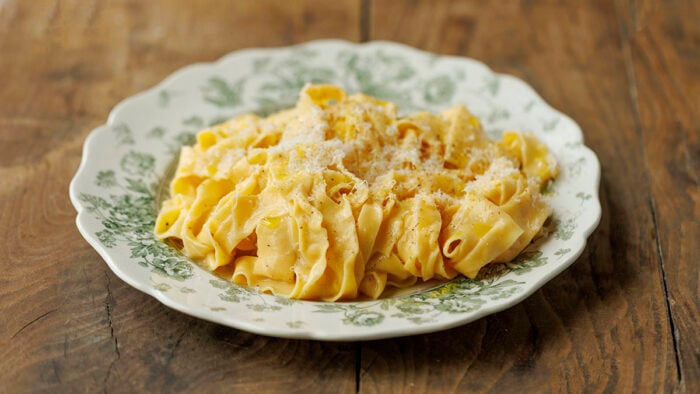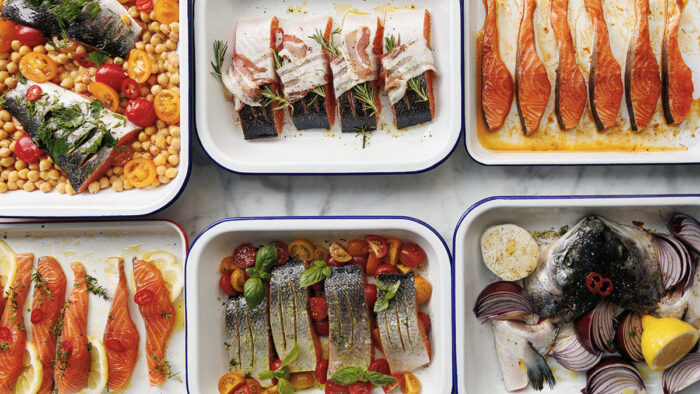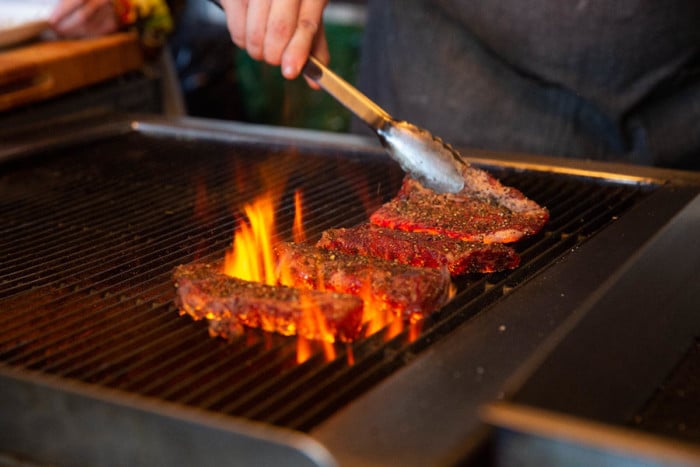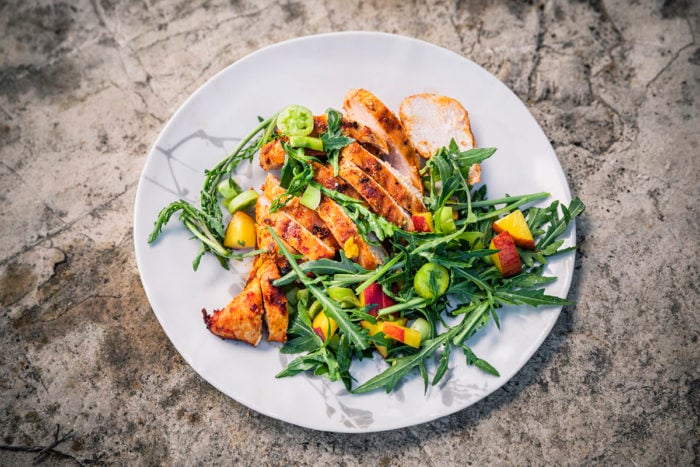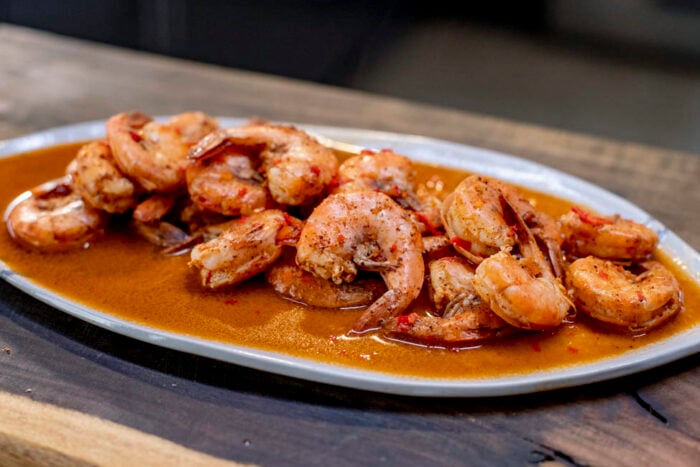
How to make the best roasted eggplant
Written by the YesChef staff
Right now in restaurants and in kitchens throughout the world, eggplants of all shapes, sizes, and colors are getting roasted, sprinkled with salt and pepper and all sorts of seasonings, and transformed into delicious dishes. Small, sweet Italian eggplants are being incorporated into lasagna and eggplant parmesan; long thin Japanese eggplants are getting tossed into stir fries; small round Indian eggplants are starring in curries, stews, and dips; and white Middle Eastern eggplants are being made into baba ganoush. What this means for you, dear eater, is that the possibilities for your roasted eggplant recipes are endless. Learn all about roasting eggplant and watch “The Godfather of Modern Israeli Cuisine,” chef Erez Komarovsky, teaching his recipe for a perfectly tender fire-roasted eggplant salad.
In this article
- Why Roast Eggplant?
- Various Roasted Eggplant Recipes
- Other Uses for Roasted Eggplant
- How to Cook Roasted Eggplant
- Erez’s Method: Cooking Eggplant Over an Open Flame
- Tips, Tricks, and Fun Facts about Roasting Eggplants
- How to Pick an Eggplant for Roasting
- Is Roasted Eggplant Healthy?
- Erez Komarovsky's Roasted Eggplant Recipe
EREZ KOMAROVSKY
Why Roast Eggplant?
Various Roasted Eggplant Recipes
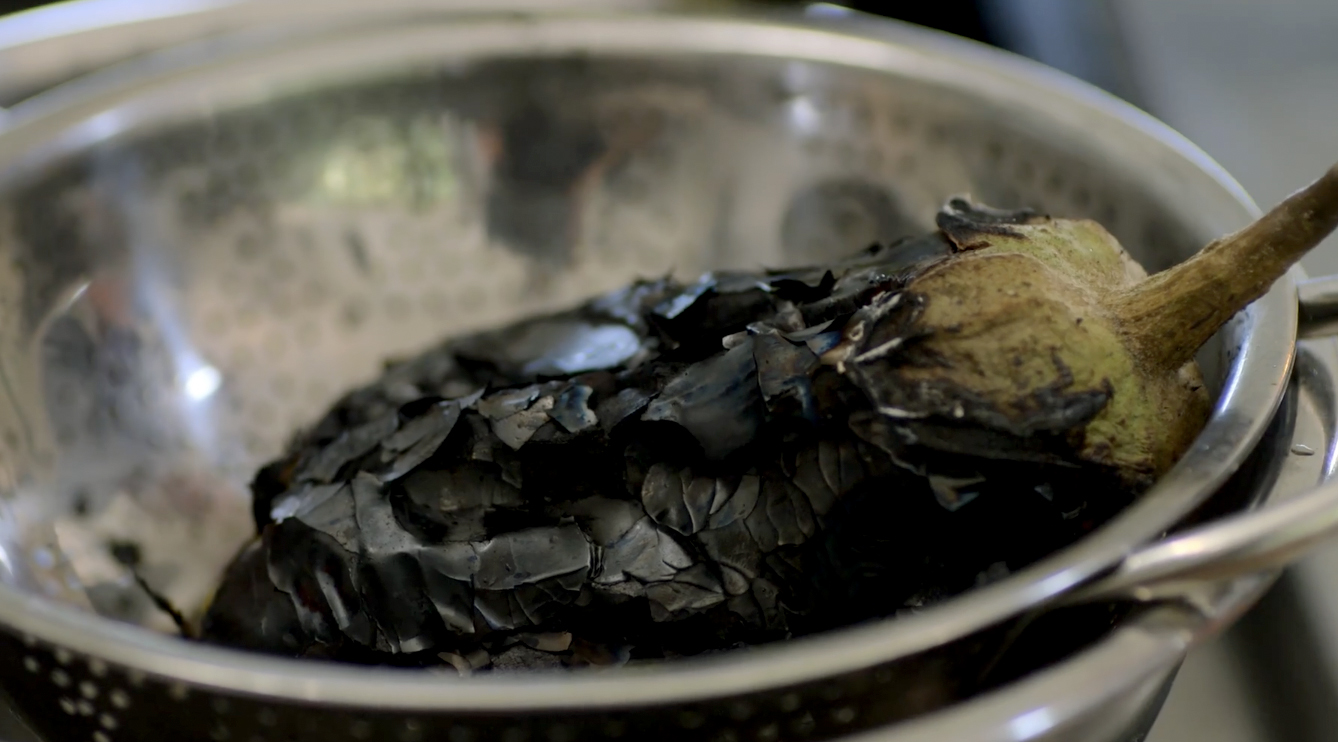
Other Uses for Roasted Eggplant
How to Cook Roasted Eggplant
With just some brief Prep Time, here’s how to get your eggplant ready for cooking. You’ll just need a few kitchen tools and simple seasonings such as salt and pepper.
Cut Into Cubes, Slices, or Steaks
According to a common roasted eggplant recipe, the first step is to remove the eggplant’s stem with a knife. After that, slice the eggplant into cubes, rectangles, or steaks about an inch thick. You will want to preheat your oven to 425 degrees Fahrenheit, give or take 25 degrees.
Salt and Season the Eggplant
Before you roast your eggplant, most recipes suggest that you season it. If making cubed eggplant, you can place it in a colander and sprinkle it with salt. If you so desire, you can also add black pepper and olive oil in addition to the salt – and even seasonings like garlic powder and paprika for some extra flavor. (Some recipes state that adding flavor isn’t necessary because eggplants aren’t as bitter as they once were, but this isn’t a consensus view.)
If you had sliced your eggplant into a steak, salt and season both sides of it. Like with cubed eggplant, the Prep Time required to roast steaks of eggplant is also minimal. You can also season your eggplant in a large bowl or wait until the eggplant you are about to roast is spread out on a baking sheet. (Alternatively, you can season your eggplant during the next step, when it is spread out across a baking sheet.)
Transfer to Baking Sheet
Line a baking sheet with parchment paper and transfer the eggplant cubes, slices, or steak onto it. This is important when making oven roasted eggplant because the parchment paper will prevent the caramelized outside of the eggplant from sticking to the baking sheet and thus reducing the caramelized flavor.
Roast Eggplant
Roast your cubed eggplant in the oven. Flip it over at some point to ensure that both sides become tender and golden brown. An eggplant roasted at a higher temperature will keep the eggplant interior nice and juicy; you don’t want the juice escaping the eggplant. Remove from the oven when the eggplant is caramelized on the outside and juicy on the inside.
Roast Eggplant Cook Time
The cook time when you roast slices of eggplant (or cubed eggplant) varies. If setting the oven to 400 degrees it may take closer to 45 minutes for your oven roasted eggplant to become perfectly tender; set your oven to 425 and your eggplant should become tender in about 30 minutes.
Another roasting variable is the size of the eggplant – skinnier Japanese eggplants take less time; large globe eggplants longer – and eggplants can take anywhere from 15 to 45 minutes to roast in the oven. Eggplant artisans generally will preheat the oven to 425 degrees Fahrenheit on average, with a temperature generally ranging from 400 to 450 degrees.
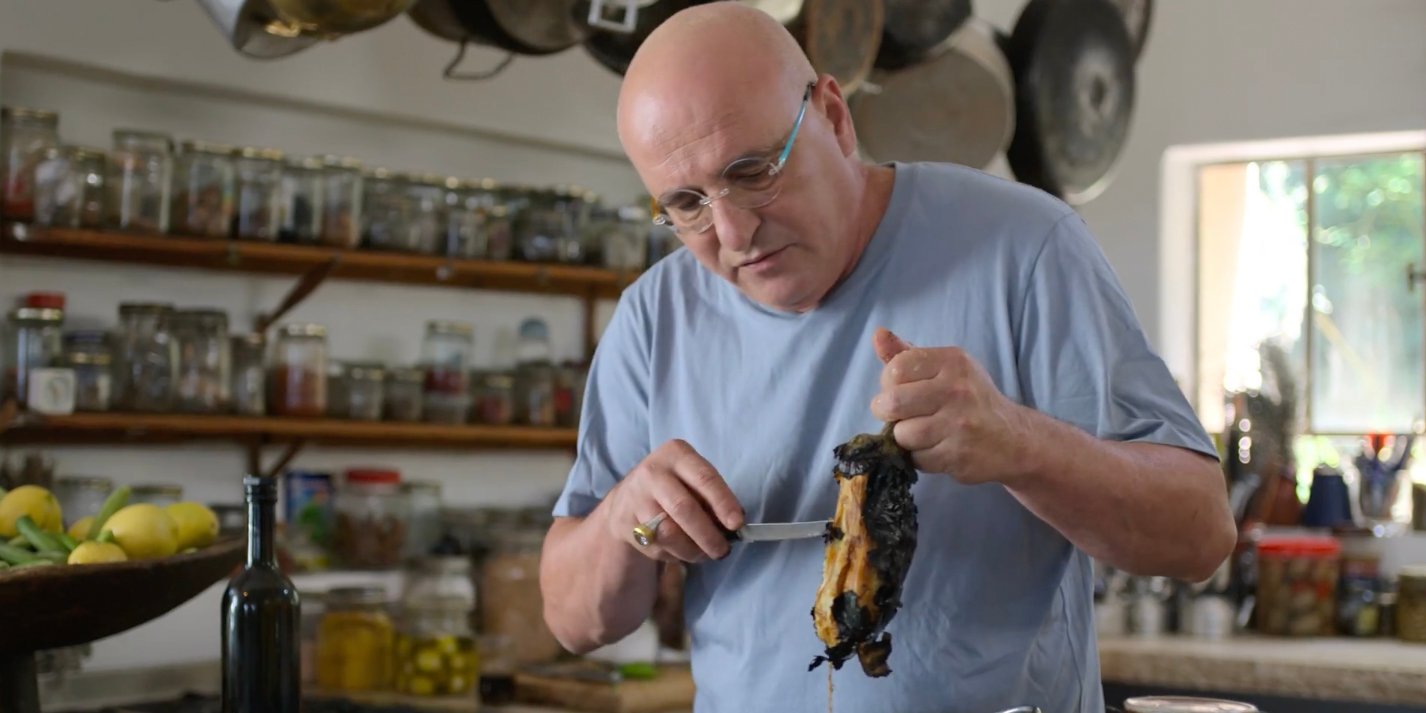
Get Access to an Ever-Growing Library of Classes
Every Subscription includes:
- Unlimited Streaming of all Classes
- Watch on your phone, tablet or laptop
- Story-driven Classes, Practical Lessons
- Recipes with Step-by-Step Guidance
- 30-day Satisfaction Guarantee
- New Lessons added all the time
Billed annually
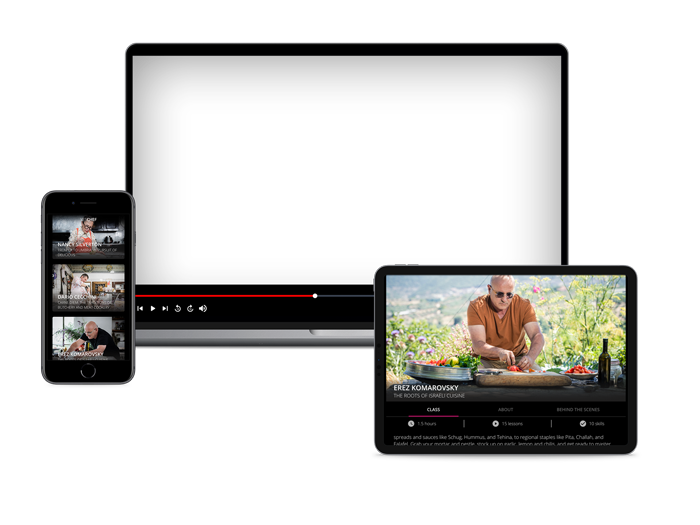
Erez’s Method: Cooking Eggplant Over an Open Flame
Tips, Tricks, and Fun Facts about Roasting Eggplants
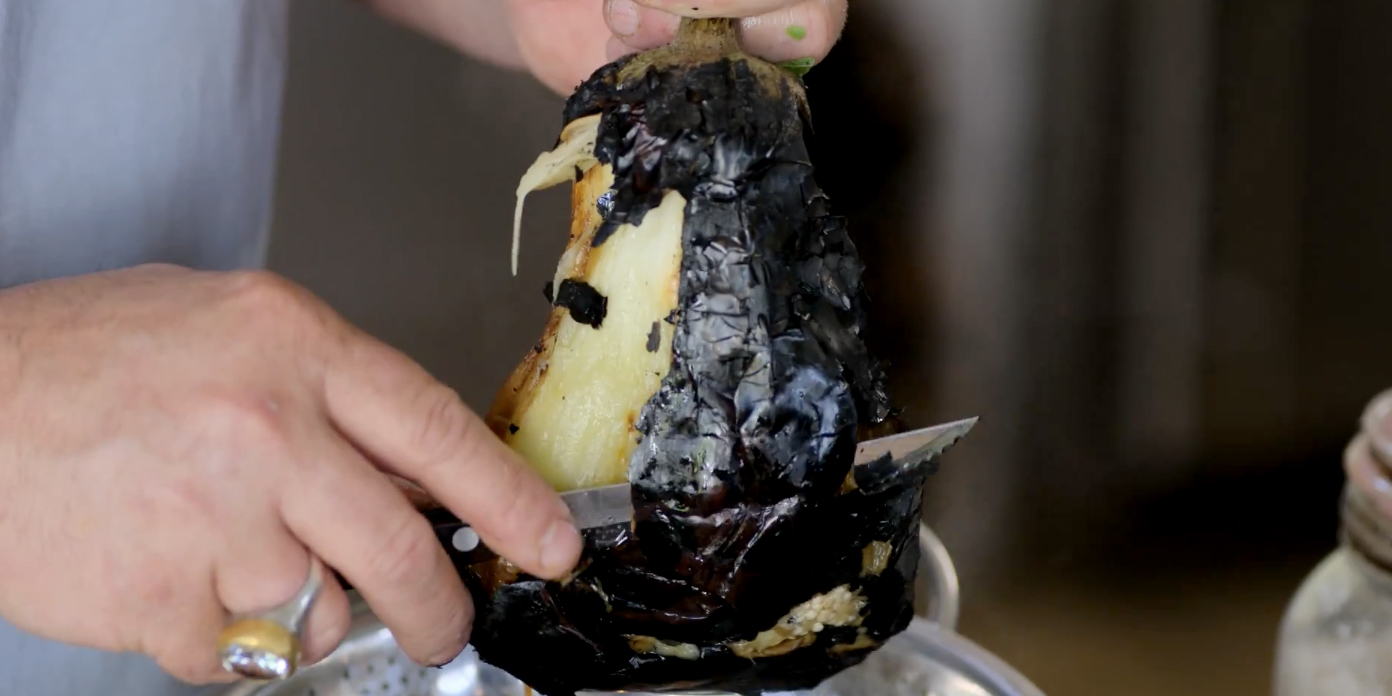
How to Pick an Eggplant for Roasting
The most common eggplants you’ll see in a supermarket in the United States are large eggplants with dark-purple skin called globe eggplants, or American eggplants. Globe eggplants can become very savory and flavorful when cooked and are excellent for cooking over an open flame. But any eggplants can taste terrific when cooked, from Japanese and Chinese eggplants with their thin skin and delicious creamy taste to the small, sweet (and equally delicious) “Fairy Tale” eggplant.
When selecting the eggplant you want to use for roasting, look for an eggplant with smooth, firm skin. Soft spots mean the vegetable – sorry, the fruit! – is starting to spoil. You’ll also want to choose an eggplant that feels heavy. An eggplant whose weight is too light should be avoided because it is likely dried out.
Additionally, avoid cooking eggplants with lots of seeds in them because they tend to be more bitter. How do you know by looking at an eggplant how seedy it is? One clue is its size. Smaller eggplants, which are younger, customarily have fewer seeds and are therefore less bitter than more mature eggplants, which are bigger and puffier. The sex of an eggplant – yes, eggplants can be male or female – also provides a clue. Male eggplants, which have fewer seeds and are therefore not as bitter, can be identified by round, shallow indentations at their bottom. Female eggplants, which have deeper dash-shaped dimples at their bottom, are bitter and thus to be avoided. And so, for a more meaty, less bitter-tasting eggplant, select fruits at your market that are male and on the smaller side.
Is Roasted Eggplant Healthy?
Unless you load them with oil or with salt, eggplants are pretty healthy to roast. They originated in Asia and India and were brought to Europe during the early Middle Ages, but have been used in traditional medicine for millennia. But why are they healthy to cook?
For one thing, they are low in calories and fat (including both Monounsaturated fat and polyunsaturated fat) and have a decent amount of fiber and potassium. Also, eggplants contain healthy amounts of Vitamin C and Vitamin A, which are antioxidants. There is a good reason why eggplants are an important and healthy staple in many vegan and vegetarian diets.
(Note: When cooking eggplant, consider adding black pepper to your recipe; according to studies, black pepper is anti-inflammatory and is thought to contain antioxidant properties.)
Erez Komarovsky's Roasted Eggplant Recipe
SERVES: 4 | HANDS-ON: 10 mins | TOTAL: 30 mins
Ingredients
- 1 large eggplant
- Olive oil
- 2 tablespoons lemon juice
- Raw tahini
- Salt to taste
- Pomegranate syrup
- 1 crushed garlic clove
- Garlic press
- Colander
- 1 small knife
- Decorative platter
- Tongs
Recipe
- Place eggplant on a grate set directly over a burner on high heat and cook, turning, until the eggplant is charred and slumped, 15 to 18 minutes.
- Transfer to a colander to drain and cool slightly.
- While still warm, remove most of the skin, leaving some charred flecks on the eggplant.
- Transfer to a decorative platter and use a knife to score the eggplant up to the stem, but not completely through, so it remains in one piece.
- Add garlic, salt, and lemon juice directly on top of the eggplant.
- Finish it off with raw tahini, pomegranate syrup, and olive oil.
Bring home the world’s most delicious foods and become a better chef with the YesChef Annual Membership. Gain unlimited access to an ever-growing library of exclusive online video classes taught by the world’s best chefs, including Francis Mallmann, Nancy Silverton, Asma Khan, Kwame Onwuachi, Erez Komarovsky and more.
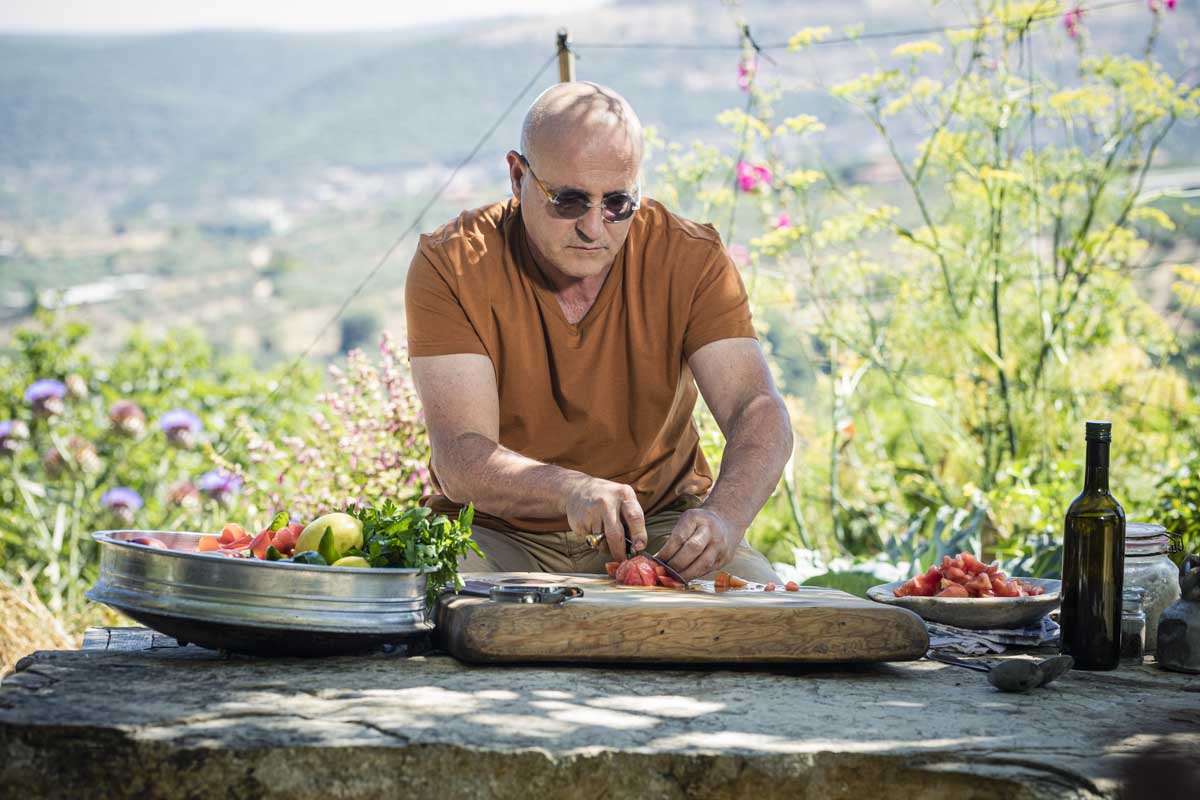
More Articles
What is Bagna Cauda? How to Make and Serve Bagna Cauda
Easy steak recipe: Chi Spacca pepper steak
How To Make Kohlrabi Kimchi Recipe
Our Favorite Holiday Side Dishes
Bucatini Carbonara
How Many Teaspoons in a Tablespoon
world’s best chefs
